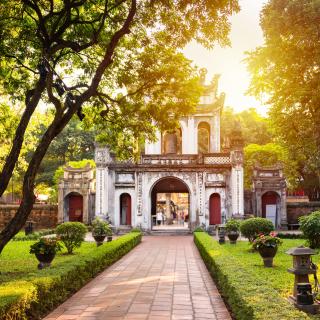Vietnamese is a member of the family of languages known as Austro-Asiatic, whose origins date back some 3000-4000 years. Vietnamese vocabulary retains elements from Chinese, and its written form at one time used a modified set of Chinese characters called chữ nôm. As a byproduct of six decades of French colonial rule, Vietnamese was also influenced by French. The Vietnamese alphabet in use today (quốc ngữ) is a Latin (Roman) alphabet with diacritics to indicate tones.
Our program provides language instruction from elementary through advanced, along with a course on Vietnamese culture and literature in translation.
Courses at the elementary, intermediate, and advanced levels (110-180) are open to both graduate and undergraduate students. Graduate students should consult with their home departments regarding course credit; consult Yale Online Course Information for current year course offerings and schedules.
Beginning classes (VIET 110/120) welcome students who have no prior knowledge or experience of Vietnamese. An Accelerated entry-level class (VIET 132/142) is available for those heritage students who have some familiarity with spoken Vietnamese, and wish to advance their skills in reading, writing and verbal competence.
A Certificate in Advanced Language Study in Vietnamese is available to Yale College students who wish to pursue advanced proficiency, and will be listed on the student’s transcript. Interested students should contact the instructor.
A course on Vietnamese Culture, Values and Literature (VIET 220) is offered in alternate years to both language and non-language students. All readings are in translation, and no previous knowledge of Vietnamese is required. Selected readings are from Zen poems, folklore, autobiographies, and religious and philosophical writings.
For those students who would like to learn more about Vietnam and the region, the Yale Vietnamese Studies Group (YVSG) coordinates a forum for research and cultural studies in and about Vietnam, and works with the Council to host guest speakers, artists, and film screenings throughout the year.
Experiencing Vietnam’s language, culture and history can also be done through various Study Abroad programs sponsored by Yale and other institutions. Students at Yale can apply for summer fellowships to support study or research projects in Vietnam.
